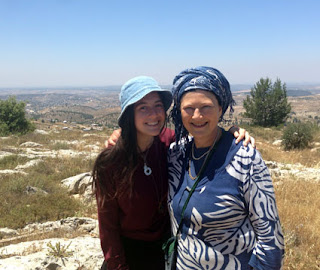Life Lessons from the Rebbetzin’s Heart – Parashat B’Har
Anywhere but in Israel
Celebrating Israel’s Independence Day, here in Bat Ayin, Gush Etzion, was filled with special meaning. For starters, we picked delightful, shiny שסק/shesek – loquat, from my bursting trees, took tithes and relished them while learning about our connection to this holy land. In the Chareidi Yeshiva in which I was raised, they didn’t celebrate Yom Ha’atzmaut. In general, the Chareidi community does not recognize the State of Israel as the beginning of Geulah. Conversely, I remember a very powerful statement by Rabbi Yehuda Cooperman, z”l, the founder of Michlalah – the first Torah college for Women in Jerusalem, where I later had the zchut (merit) to learn. He compared the gift of the land of Israel with receiving the Torah. “Just Because the Israelites fabricated the Golden Calf, does that imply we shouldn’t thank Hashem for giving us the Torah? Likewise, just because the founders of the State of Israel created a secular state, not based on Torah laws; do we not owe gratitude to Hashem for returning the Land of Israel into Jewish hands after more than 2000 years of exile?” The impression of these words were deeply engraved into my heart, and resonated with my innate gratitude to Hashem for returning the Land of Israel to its rightful people. Even if I don’t always agree with our government and how the secular state deviates from Torah in many ways, I, for one, can testify that I would never be living a Torah life if it wasn’t for the State of Israel. If you think it may be dangerous to live in Israel today, just think back a few decades, prior to 1948, when we didn’t have any army to protect us. I definitely would not have risked my life to come to some vaguely known Palestine filled with aggressive Arabs and biased Brits, where my Jewish ancestors may have lived millenniums ago. Without the State of Israel, I may have remained a secular, confused, Danish, hippy girl forever! I am positive that I’m not the only one who wouldn’t have discovered the light of Torah anywhere but in Israel.
Celebrating Sunrise
Although the secular state, in its initial years, secularized many faithful Torah Jews and committed terrible crimes against the Yemenite Jews, today there are more centers of Torah study in Israel than in all the rest of the world. When I recently took a bus-ride in Jerusalem and looked around at my fellow travelers, I couldn’t help but noticing how the bus-population consisted predominantly of religious looking Jews: from the head scarfed elderly woman reciting tehillim, to the Chassid in his fur hat. It seems that Israel’s population is gradually becoming more and more Torah observant. “Redemption doesn’t come in one shot, but rather little by little. Redemption is compared to a sunrise. There is no greater darkness than the hour before dawn, but after that, the light gradually grows. First, the ray of dawn rises and illuminates the world. Then the sun itself rises and grows progressively brighter and stronger until all is flooded by daylight…” (Midrash Tehillim 18). With any growth, there are always setbacks. In the case of the State of Israel, one of the greatest setbacks was the dismantling of the thriving Jewish communities of Gush Katif z”l in year 2005. This tragic expulsion caused many prior devoted Zionists to stop celebrating Yom Ha’atzmaut. Although, I can identify with their disillusionment, I do not agree. Thanking and praising Hashem for miraculously returning us, the rightful owners, to our Promised Land cannot be depreciated by any Israeli, anti-Torah action. The celebration of the Fifth of Iyar is not about what the people of Israel did or didn’t do with this land. It is not about us, but rather, about Hashem and His tremendous gift that we awaited for more than 2000 years.
The Strings of Torah Attached to the Land
When the entire world, including many Jews, doubt the Jewish right to the Land of Israel, we, too, cannot evade asking ourselves whether we really deserve this land. The Torah clearly promises the Land of Israel to Avraham, Yitzchak, Ya’acov and all of his children – the Israelites, but is this a promise without any strings attached? This week’s parasha clearly teaches that we have to earn the right to live securely in our Promised Land.
We surely have the inherent right to the Land of Israel, because Hashem promised it to our forefathers for an eternal inheritance, as mentioned multiple times in the Torah (See for example Bereishit 13:15). However, living securely on this land is another story. Hashem granted us the Holy Land because it is the only place on earth where we can observe the Torah fully. This is why, Hashem “brought you out of the land of Egypt, to give you the land of Canaan to be your G-d” (Vayikra 25:38). In my personal experience, only in Israel did I feel the connection to Hashem as my G-d. Our parasha emphasizes that Hashem is not just the Creator but He is our G-d. We have a personal relationship with Hashem, and because of this, we are charged with the responsibility to observe His statutes. Eventually, we will fulfill this responsibility. Hashem will ensure that we all repent, stop throwing garbage in the streets of the holy cities, cease from Shabbat desecration, and from speaking lashon hara, and unholy speech.
Abstaining from the Speech of the Spies
The land of Israel is like a wife whose love must be earned. While our parasha makes it clear that living securely in the Land of Israel depends on our keeping the Torah laws in their totality, I found it interesting that Parashat B’Har singles out the mitzvah of keeping Shemitah and Jubilee, and the importance of abstaining from verbal abuse (Rashi, Vayikra 25:17). These laws are expressions of how a husband must treat his wife respectfully. Just as the husband has to wait for his wife to count seven-clean-days before she immerses in the Mikvah, so must the people of Israel honor the land’s seven-year cycle and abstain from physical relations every sabbatical year. The first step towards marital fulfillment is to consummate the marriage. The consummation of our relationship with the Land of Israel takes place through taking possession of it, which implies the recognition of the Divinely ordained State of Israel as part of our ultimate redemption. The subsequent steps are to build it up and plant in the land as it states, “Return to your cities, build Jerusalem,” (Yirmeyahu 31:20). “It is the time to favor her” (Tehillim 102:14). “To favor” refers to planting as it states, “…he will favor her dirt” (ibid. 15), (Kol HaTor 1:6). Finally, we must abstain from the speech of the spies, who lacked commitment, faith and devotion, so vital for a marital relationship. Our successful relationship with the Holy Land is expressed through speaking respectfully to her with words of praise for the Land. Just as when a husband and wife live together in peace, the Shechina (Divine Presence) dwells between them, so when we put the Divine Presence between us and the land, we will be able to live peacefully in it. Terrorism will become history the moment we unite as a people to “faithfully keep Hashem’s laws and rules” in the land!
http://www.voices-magazine.com/#


So beautiful; I loved your comparison to the wife, and the relationship of a husband and wife, to the land and Hashem. Very much appreciated this. 🙂